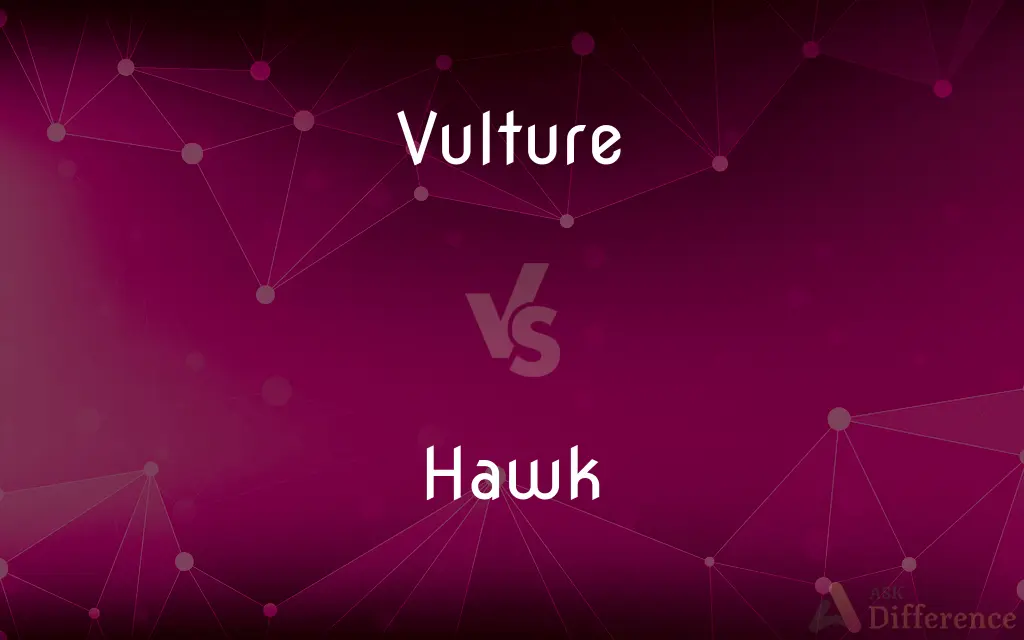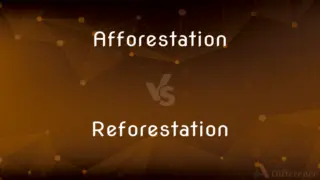Vulture vs. Hawk — What's the Difference?
By Tayyaba Rehman — Updated on October 27, 2023
Vultures are scavenging birds that primarily feed on dead animals; hawks are birds of prey that hunt live animals.

Difference Between Vulture and Hawk
Table of Contents
ADVERTISEMENT
Key Differences
Vultures and hawks belong to the avian world, but they play very different ecological roles. Vultures are typically scavengers, which means they feed mainly on the carcasses of dead animals. This behavior not only provides them with nourishment but also helps in cleaning the environment of decaying matter. Hawks, in contrast, are raptors or birds of prey. They have sharp talons and beaks to hunt and consume live animals, ranging from small mammals to insects and birds.
The physical characteristics of vultures and hawks also reflect their distinct lifestyles. Vultures often have a bald head, which is an adaptation to prevent feathers from getting soiled while feeding on carcasses. They also possess a keen sense of smell to locate dead animals. Hawks, on the other hand, have keen eyesight, which aids them in spotting their prey from great distances. Their powerful talons are used to grasp and kill prey, and their beaks are shaped to tear meat.
Flight patterns of vultures and hawks are quite distinct. Vultures, with their broad wings and relatively short tails, can soar for long periods, riding thermal updrafts while scanning the ground for food. Hawks, depending on the species, may exhibit a variety of flight patterns, from soaring to flapping and gliding. Their wing and tail shapes are optimized for hunting agility.
Habitats and behaviors of vultures and hawks further distinguish them. Vultures are often found in open areas, including savannahs, grasslands, and deserts, where they can easily spot carrion. Hawks inhabit a broader range of habitats, from forests to open fields. They may be seen perched, waiting patiently for prey or actively soaring in search of food.
In summary, while both vultures and hawks are vital components of their ecosystems, they differ greatly in their feeding habits, physical characteristics, flight patterns, and habitats. Vultures are nature's cleanup crew, feeding on the dead, while hawks are adept hunters, pursuing live prey.
ADVERTISEMENT
Comparison Chart
Diet
Scavenging on dead animals
Hunting live animals
Physical Traits
Bald head, broad wings
Sharp talons, keen eyesight, agile in flight
Flight Pattern
Soars on thermals, less agile
Varies, often more agile
Habitat
Open areas like savannahs and deserts
Forests to open fields
Role in Ecosystem
Cleanup of decaying matter
Control populations of smaller animals
Compare with Definitions
Vulture
A large bird that feeds chiefly on carrion.
The vulture circled above the dying animal.
Hawk
A bird of prey with sharp talons and keen eyesight.
The hawk swooped down to catch its prey.
Vulture
A person who preys on others or exploits them.
The media was criticized for being vultures during the tragedy.
Hawk
Birds with a strong predatory instinct.
The hawk's sharp vision aids it in hunting.
Vulture
A scavenger that consumes dead animals.
Vultures play an essential role in the ecosystem by cleaning up carcasses.
Hawk
A creature known for its hunting prowess.
The hawk is a master at aerial pursuits.
Vulture
A creature that waits for an opportunity to take advantage of situations.
The vulture waited for the other animals to leave before descending on the remains.
Hawk
Hawks are a group of medium-sized diurnal birds of prey of the family Accipitridae. Hawks are widely distributed and vary greatly in size.
Vulture
Birds with a bald head and keen sense of smell.
The vulture's bald head is adapted to its scavenging lifestyle.
Hawk
Any of various birds of prey, especially of the genera Accipiter and Buteo in the family Accipitridae, characteristically having a short hooked bill and strong claws used for seizing.
Vulture
A vulture is a bird of prey that scavenges on carrion. There are 23 extant species of vulture (including Condors).
Hawk
Any of various similar birds of prey.
Vulture
Any of various large birds of prey characteristically having dark plumage and a featherless head and neck and generally feeding on carrion. Species found in the Americas are in the family Cathartidae, and those found in Eurasia and Africa are in the family Accipitridae.
Hawk
A person who preys on others; a shark.
Vulture
A person of a rapacious, predatory, or profiteering nature.
Hawk
One who demonstrates an actively aggressive or combative attitude, as in an argument.
Vulture
Any of several carrion-eating birds of the families Accipitridae and Cathartidae.
Hawk
A person who favors military force or action in order to carry out foreign policy.
Vulture
A person who profits from the suffering of others.
Within ten minutes of the accident, the vultures appeared and were organizing lawsuits.
Hawk
An audible effort to clear the throat by expelling phlegm.
Vulture
To circle around one's target as if one were a vulture.
Rudy vultured when asking the girl out.
Hawk
To hunt with trained hawks.
Vulture
(obsolete) ravenous; rapacious
Hawk
To swoop and strike in the manner of a hawk
"It was fun to watch the scattered snail kites ... lifting and falling in the wind as they hawked across the shining grass and water" (Peter Matthiessen).
Vulture
Any one of numerous species of rapacious birds belonging to Vultur, Cathartes, Catharista, and various other genera of the family Vulturidæ.
Hawk
To peddle goods aggressively, especially by calling out.
Vulture
Any of various large diurnal birds of prey having naked heads and weak claws and feeding chiefly on carrion
Hawk
To peddle (goods) aggressively, especially by calling out.
Vulture
Someone who attacks in search of booty
Hawk
To clear or attempt to clear the throat by or as if by coughing up phlegm.
Hawk
To clear the throat of (phlegm).
Hawk
A diurnal predatory bird of the family Accipitridae, smaller than an eagle.
It is illegal to hunt hawks or other raptors in many parts of the world.
Hawk
Any diurnal predatory terrestrial bird of similar size and appearance to the accipitrid hawks, such as a falcon.
Hawk
(entomology) Any of various species of dragonfly of the genera Apocordulia and Austrocordulia, endemic to Australia.
Hawk
(politics) An advocate of aggressive political positions and actions.
Hawk
(game theory) An uncooperative or purely-selfish participant in an exchange or game, especially when untrusting, acquisitive or treacherous. Refers specifically to the Prisoner's Dilemma, alias the Hawk-Dove game.
Hawk
A plasterer's tool, made of a flat surface with a handle below, used to hold an amount of plaster prior to application to the wall or ceiling being worked on: a mortarboard.
Hawk
A noisy effort to force up phlegm from the throat.
Hawk
(transitive) To hunt with a hawk.
Hawk
(intransitive) To make an attack while on the wing; to soar and strike like a hawk.
To hawk at flies
Hawk
(transitive) To sell; to offer for sale by outcry in the street; to carry (merchandise) about from place to place for sale; to peddle.
The vendors were hawking their wares from little tables lining either side of the market square.
Hawk
To expectorate, to cough up something from one's throat.
Hawk
To try to cough up something from one's throat; to clear the throat loudly.
Grandpa sat on the front porch, hawking and wheezing, as he packed his pipe with cheap tobacco.
Hawk
One of numerous species and genera of rapacious birds of the family Falconidæ. They differ from the true falcons in lacking the prominent tooth and notch of the bill, and in having shorter and less pointed wings. Many are of large size and grade into the eagles. Some, as the goshawk, were formerly trained like falcons. In a more general sense the word is not infrequently applied, also, to true falcons, as the sparrow hawk, pigeon hawk, duck hawk, and prairie hawk.
Hawk
An effort to force up phlegm from the throat, accompanied with noise.
Hawk
A small board, with a handle on the under side, to hold mortar.
Hawk
To catch, or attempt to catch, birds by means of hawks trained for the purpose, and let loose on the prey; to practice falconry.
A falconer Henry is, when Emma hawks.
Hawk
To make an attack while on the wing; to soar and strike like a hawk; - generally with at; as, to hawk at flies.
A falcon, towering in her pride of place,Was by a mousing owl hawked at and killed.
Hawk
To clear the throat with an audible sound by forcing an expiratory current of air through the narrow passage between the depressed soft palate and the root of the tongue, thus aiding in the removal of foreign substances.
Hawk
To raise by hawking, as phlegm.
Hawk
To offer for sale by outcry in the street; to carry (merchandise) about from place to place for sale; to peddle; as, to hawk goods or pamphlets.
His works were hawked in every street.
Hawk
Diurnal bird of prey typically having short rounded wings and a long tail
Hawk
An advocate of an aggressive policy on foreign relations
Hawk
A square board with a handle underneath; used by masons to hold or carry mortar
Hawk
Sell or offer for sale from place to place
Hawk
Hunt with hawks;
The Arabs like to hawk in the desert
Hawk
Clear mucus or food from one's throat;
He cleared his throat before he started to speak
Hawk
A diurnal bird that hunts during the day.
The hawk perched on the tree, watching for movement below.
Hawk
A person who advocates an aggressive or warlike policy.
He was known as a hawk for his strong stance on military intervention.
Common Curiosities
Why do vultures have a bald head?
Vultures have a bald head to prevent their feathers from getting soiled while feeding on carcasses.
What assists hawks in hunting?
Hawks have keen eyesight and sharp talons which aid them in hunting.
Do vultures hunt live animals like hawks do?
Typically, vultures scavenge on dead animals, while hawks hunt live prey.
Do vultures kill other animals?
Vultures are mainly scavengers and prefer eating dead animals, although some species may occasionally hunt.
What do vultures primarily feed on?
Vultures primarily feed on the carcasses of dead animals.
Are vultures and hawks related?
Both are birds, but they belong to different families and have different ecological roles.
How do hawks catch their prey?
Hawks use their sharp talons and beak to catch and kill prey.
Why are vultures important for the environment?
Vultures help clean the environment by consuming decaying matter.
Are hawks scavengers like vultures?
No, hawks are birds of prey that hunt live animals.
Where are vultures typically found?
Vultures are often found in open areas, such as savannahs and deserts.
Can the term "vulture" refer to a person?
Yes, metaphorically, a "vulture" can describe someone who exploits or preys on others.
What kind of habitats do hawks prefer?
Hawks can be found in a range of habitats, from forests to open fields.
Is a hawk always a reference to a bird?
Mostly, but "hawk" can also metaphorically describe a person advocating aggressive actions.
Are all hawks diurnal?
Most hawks are diurnal, meaning they are active during the day.
Do hawks and vultures compete for food?
Generally, they don't, as vultures eat carrion and hawks hunt live prey.
Share Your Discovery

Previous Comparison
Afforestation vs. Reforestation
Next Comparison
Bibliography vs. ReferenceAuthor Spotlight
Written by
Tayyaba RehmanTayyaba Rehman is a distinguished writer, currently serving as a primary contributor to askdifference.com. As a researcher in semantics and etymology, Tayyaba's passion for the complexity of languages and their distinctions has found a perfect home on the platform. Tayyaba delves into the intricacies of language, distinguishing between commonly confused words and phrases, thereby providing clarity for readers worldwide.














































